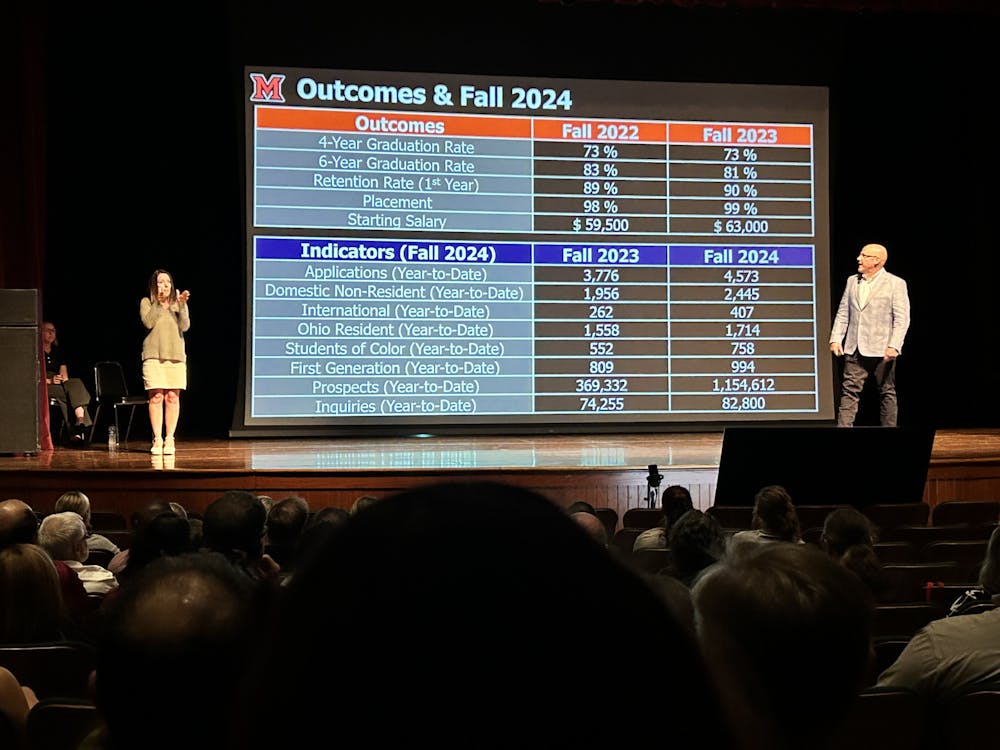Miami University President Greg Crawford shared the challenges facing Miami and higher education, updated the community on recruitment initiatives and highlighted the achievements of faculty and students at his State of the University Address Oct. 3.
Miami’s Men’s Glee Club opened the address with a performance in Hall Auditorium before Crawford delved into the numbers associated with the changing landscape of higher education.
With college admission rates declining nationally, Crawford explained how the university is responding to the changing demographics and feelings around attending college.
“For the first time in a long time, we've actually answered the question: Why is college worth it?” Crawford said.
He explained that federal funding has remained relatively static in the last 10 years despite rising inflation. Crawford displayed numbers that showed the changing demographics of students applying to college and highlighted the decline of Americans who say they view higher education favorably.
Crawford then laid out Miami’s “bold and transformative strategy” within the next year to combat budget pressure and changing student demographics. These goals include improving operations and technology, aligning with student interests, possibly cutting low enrolled majors, broadening student engagement and understanding higher education’s current environment.
“We’re all working together to kind of reimagine, probably more competitive than we've ever had before and how we attract and recruit students in such a place,” Crawford said. “It'll be a little bit different than past plans to put that out there and probably do a whole lot more engagement.”
Despite the challenges laid out, Crawford highlighted Miami’s increased number of applicants, a decreased acceptance rate and increased four-year graduation and retention rates. Dips were noted in six-year graduation rates and average student GPA, and only 47 new international students committed to the university this year.
Crawford also focused on the students and staff of Miami and their accomplishments over the past several months. These included those on research grants, students and staff published in academic journals, student-athletes, the Honors College and new Miami programs such as the Pathways Program and RedHawk50 program.
Crawford also gave a shout-out to The Miami Student’s podcast “People and Policies,” hosted by staff writers Raquel Hirsch and Olivia Patel. “People and Policies” focuses on local government and the lead up to this year’s Oxford City Council and Talawanda School Board elections.
Enjoy what you're reading?
Signup for our newsletter
Sustainability and diversity initiatives were also a big theme at the address. Notably, Miami plans to achieve carbon neutrality by 2040 in accordance with the Climate Action Plan.
Next on the agenda was discussing Miami’s Power of Will campaign. Aimed at recruiting new students and retaining those already enrolled, the campaign has been raising money for the past seven years.
“Our number today is $627 million dollars and [we’ll] get to a billion in the next few years,” Crawford said. “And 85% of that money raised so far is targeted towards academics.”
Lea Minniti, the assistant dean of the College of Education, Health, and Society, attended the presentation because she believes it’s always useful to know what’s going on around the University.
“President Crawford started with the challenges, and higher ed is facing a lot of challenges nationally,” Minniti said. “But ultimately, I'm leaving feeling inspired by the stories of the collective work that we're doing as a university, the research that's impacting people's lives, the student projects that are meaningful, showcasing the examples across the university that [I] think make Miami special.”
Darek Sanabria Valderrama, a junior diplomacy major who was invited to present research on behalf of the College Democrats, appreciated how the address highlighted Miami’s investment in student programs and involvement. However, Valderrama also believed there should have been more mention of the problems Miami currently faces.
“I would love to see more talks about the politics of public college because that is a very real thing that is affecting Miami University itself, especially with S.B. 83,” Valderrama said.
Senate Bill 83 (S.B. 83), also known as the Ohio Higher Education Enhancement Act, was passed on May 17, 2023, by the Ohio Senate. The bill changes guidelines on subjects that can be taught in public universities, notably labeling topics such as diversity, equity and inclusion and climate change as “controversial topics” while also forcing educators to make their syllabi publicly accessible.
Jocelyn Wimberly, the assistant director for Career Education and Inclusion, has worked at Miami for two years and thinks it’s very important to understand the impact of what Miami is doing as they develop career trends and prepare students for the future.
“There were a lot of things that I was able to learn, and I love any opportunity to learn,” Wimberly said. “ I think that it was motivating, I think that it was inspiring, and as we continue to move forward, I'm excited.”




